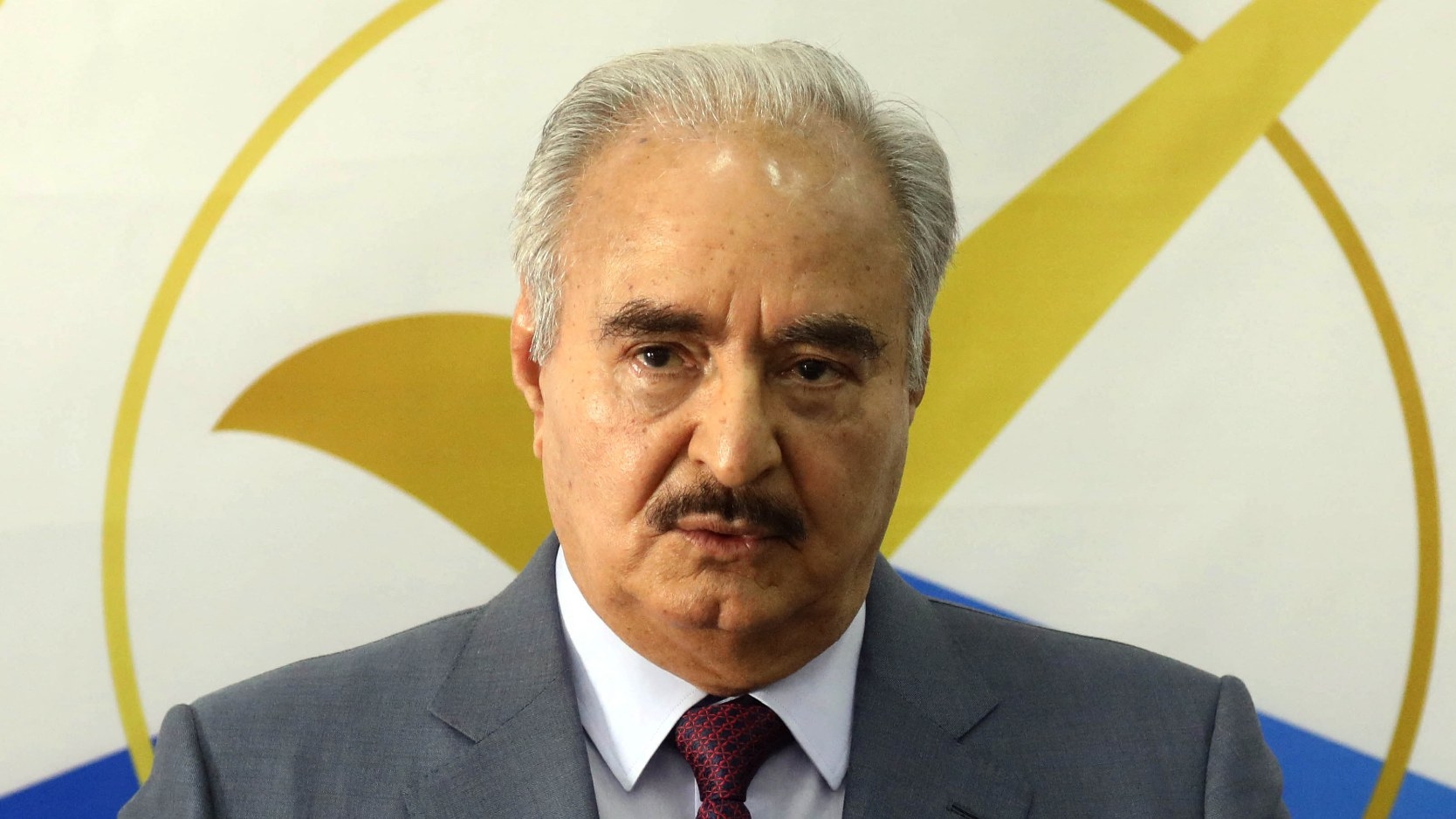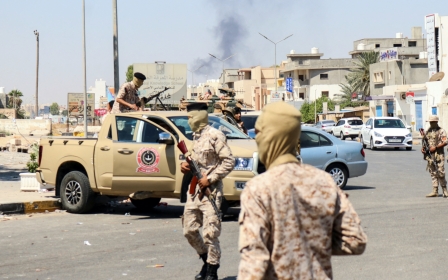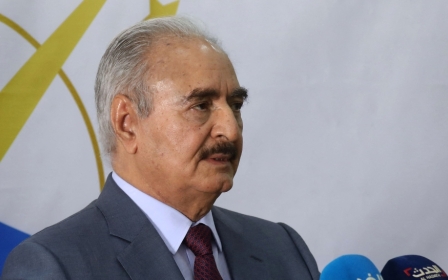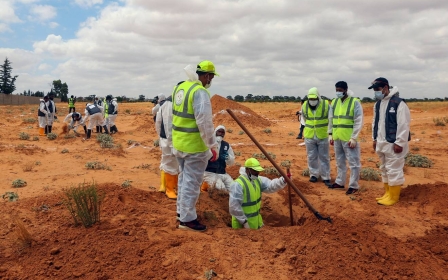US court finds Libya's Khalifa Haftar liable for war crimes

A federal US judge on Friday issued a default judgement against Libyan commander Khalifa Haftar, finding him liable for war crimes against several Libyan families who have accused him of extrajudicial killings and torture.
Judge Leonie Brinkema's judgement, which follows a previous recommendation from a magistrate judge last month, paves the way for the families in three separate civil suits to seek monetary compensation.
Following Brinkema's decision, lawyers for Haftar confirmed that they would be withdrawing as the Libyan commander's counsel, leaving him without a lawyer going forward.
'This is the culmination of years of work with Libyan victims against what the war criminal Haftar has done for so many years in Libya'
- Esam Omeish, Libyan American Alliance
Sitting anxiously in the courtroom in Alexandria, Virginia, the Libyan family members and advocates working on the case quietly burst into joy as soon as they heard Brinkema's decision. For them, this was a major victory following three years of civil litigation to hold Haftar accountable for the torture and deaths of their loved ones.
"This is the culmination of years of work with Libyan victims against what the war criminal Haftar has done for so many years in Libya," Esam Omeish, president of the Libyan American Alliance, an advocacy group that serves as a lead consultant in one of the three lawsuits, told Middle East Eye.
New MEE newsletter: Jerusalem Dispatch
Sign up to get the latest insights and analysis on Israel-Palestine, alongside Turkey Unpacked and other MEE newsletters
"These people had the brave sense of fighting in a court of law, and they wanted to have their day in court," he said.
"After three years of going back and forth of, dealing with lawyers and judges and many hearings, today, we reached a conclusion of that judgment, saying that Khalifa Haftar indeed is liable for committing these crimes against the torture victims."
Multiple Libyan families had filed lawsuits against Haftar in US courts in 2019 and 2020, in which the Libyan commander was accused of torturing and killing their relatives.
The families filed their lawsuits under the Torture Victim Protection Act of 1991, a law that allows non-US citizens to seek compensation from individuals who, acting in an official capacity for any foreign nation, allegedly committed torture or extrajudicial killing.
Haftar, a US citizen who had been a Virginia resident for decades, unsuccessfully tried to have the civil lawsuits tossed out under the claim of immunity as head of state.
Earlier this year, Haftar was a no-show at a long-sought video deposition where he was going to be asked about his alleged role in the extrajudicial killings and torture of Libyan civilians in the country's decade-long civil war.
The next step in the legal case is a hearing where the judge will evaluate what kind of compensation package the families should receive.
According to the Wall Street Journal, Haftar has owned various property holdings in Virginia worth millions of dollars.
"We will now be moving towards the damage phase," Mark Zaid, a lawyer representing one group of the plaintiffs, said during a press conference shortly after Friday's hearing. "And we'll execute upon properties wherever we can find them anywhere in the world."
"It's rumoured he has hundreds of millions of dollars, perhaps more around the world."
Global ramifications for Haftar
The judgement has serious potential ramifications both inside Libya and around the world for Haftar, who has for years been vying to become the leader of the North African country.
"Within Libya, it is a wake-up call to many people who are trying to either partner with him and what they call a democratic transition of Libya through elections," Omeish said.
"You cannot deal with a criminal who is hellbent on dictatorship and ruling the country by force as a partner."
On the international stage, having Haftar found liable for war crimes in an American court of law could create diplomatic issues for the Libyan military leader, especially in terms of Libya's relationship with Washington.
A former CIA asset, Haftar returned to Libya following the country's 2011 uprising and served in the internationally recognised government until 2014, when civil war broke out in the country.
While an April 2019 phone call between Haftar and former US President Donald Trump stoked rumours that Washington was throwing its weight behind the commander, a source with direct knowledge of the matter previously told MEE that US-Libya ties soured soon after the call.
"This has to weigh in very heavily when we have a person liable in front of a civil suit, and he is still being courted as a potential leader of Libya, as a potential presidential candidate, as a potential partner with the United States," Omeish said.
"I think it's rather egregious for us to even consider engaging him or dealing with him."
In 2019, he mounted a 14-month campaign to take control of the country's capital, Tripoli. Fighting soon devolved into a proxy conflict with his Libyan National Army (LNA) receiving support from Russia, the United Arab Emirates, Egypt, Chadian and Sudanese fighters, as well as other mercenary groups.
Haftar was eventually pushed back after Turkey intervened by providing fighters, combat drones and military equipment to support the UN-backed government in Tripoli.
Following a ceasefire in October 2020 and the establishment of a new unity government, Libya was headed towards elections in December 2021, but the vote was delayed due to a constitutional crisis and the country continues to remain politically divided.
A path to criminal prosecution
War crimes by Haftar's forces and allied groups have been well documented, including by Middle East Eye in 2020 when it investigated and revealed mass graves found in the city of Tarhuna.
With Haftar having now been found liable in a civil lawsuit, the Libyan American Alliance has said they hoped this will now lead to a path towards criminal prosecution against him.
"We call upon the Attorney General Mr Garland and others to look into the criminality of this US citizen who has committed egregious crimes in Libya," Omeish said.
Zaid, the attorney for one of the group of plaintiffs, agreed that this case could soon go from a civil one to a criminal one.
"I have made this clear. I asked both the attorney general under the Trump administration and the Biden administration that under US law - which I actually helped work on 25 or so years ago, the War Crimes Act of 1996 - that Haftar as a US citizen can and should be prosecuted," Zaid said.
"And we still hope the Biden administration will do that."
Middle East Eye delivers independent and unrivalled coverage and analysis of the Middle East, North Africa and beyond. To learn more about republishing this content and the associated fees, please fill out this form. More about MEE can be found here.





